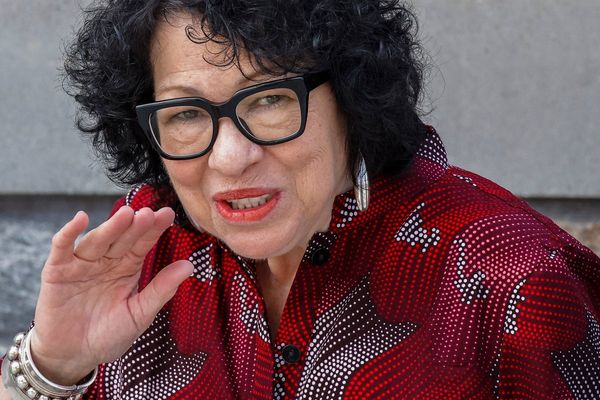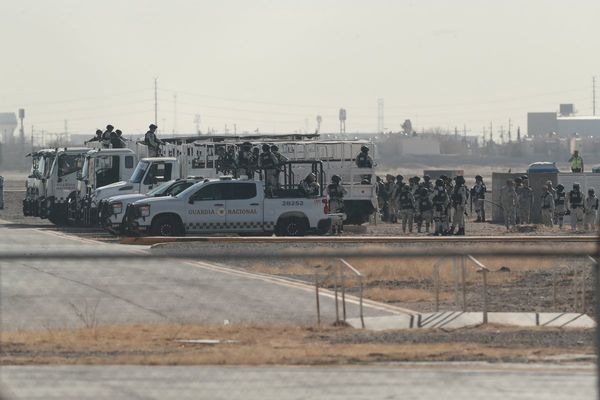
MUMBAI: In August, as India’s Adani group neared the completion of its $10.5 billion purchase of two cement businesses, the conglomerate and its banks put out some particularly complicated filings.
On page 21 of an 85-page document, was a diagram of seven unlisted firms registered in the British Virgin Islands, Mauritius and Dubai. They were interlinked to each other, and one would be buying the cement company’s shares in the open market.
But the ultimate beneficiary of the seven entities wasn’t listed as the group’s public face and chairman, billionaire Gautam Adani. Instead, the filings said their beneficial owners were his older brother, Vinod, and Vinod’s wife Ranjanben.
Neither Vinod nor Ranjanben hold managerial positions in any listed Adani companies, and they aren’t among the top executives listed on the conglomerate’s website. Yet, the appearance of their names in connection with the group’s largest ever acquisition suggests the influence that Adani’s little-known brother wields in the sprawling empire — as well as the family’s style of using a maze of small companies when doing big business.
In recent weeks, Vinod — who has worked out of Dubai for years and is described in filings as a Cypriot national — has come into the international spotlight after short seller Hindenburg Research named him prominently in its scathing report on the Adani group that fueled a rout of more than $140 billion in its shares.
“Vinod Adani, through several close associates, manages a vast labyrinth of offshore shell entities,” the report said identifying entities in Mauritius, Cyprus, the United Arab Emirates, Singapore, and several Caribbean Islands. These entities “regularly and surreptitiously transact with Adani,” it said. Hindenburg didn’t delve into the details of the cement acquisition.
The Adani group has published a 413-page rebuttal denying all Hindenburg’s allegations.
Staffers at Vinod’s Dubai offices directed requests for comment to the conglomerate’s headquarters in India.
“Vinod Adani does not hold any managerial position in any Adani listed entities or their subsidiaries and has no role in their day-to-day affairs,” an Adani group spokesperson said in response to a detailed set of questions sent by Bloomberg News. “These questions are of no relevance, and we cannot comment on the business dealings and transactions of Mr. Vinod Adani.”
The conglomerate didn’t respond to requests to make Vinod or Ranjanben — who is described as an interior designer in a Cyprus filing — available for comment.
Complex conglomerate
Even though Vinod doesn’t hold any formal positions or participate in daily operations, he’s a key negotiator for the Adani group when it’s raising funds from international markets and is involved in planning the group’s strategic direction, a person familiar with the matter said. A close confidant of Gautam, Vinod likes to keep a low profile and deals directly with family members, the person said. The family doesn’t believe it has done anything improper with business structures involving Vinod, according to the person.
Still, the Adani family plans to look more closely at some of the entities it has built to see how best to structure them going forward in order to reassure investors, the person said.
The network of small firms built by the Adani dynasty offers one of the starkest reminders yet of how complex family-run conglomerates can be in India, now one of the world’s fastest growing economies. While many companies have hired professional managers, others are still dominated by familial ties that can make it harder for banks and investors to fully know whom they are doing business with, where the money is flowing and what regulatory minefields might loom.
Vinod is a billionaire via his share holdings in listed Adani group companies. Still, he lives a largely quiet life in Dubai, people familiar with the matter said. A filing in Cyprus puts his age at 74.
The Adani group is a vast conglomerate with listed and unlisted subsidiaries doing business in everything from ports to power, with a reach spanning from India to Africa and Australia. Several debt filings include Vinod as a key figure within the conglomerate, saying the Adani group should be understood to mean Vinod, Gautam and another brother Rajesh, who is managing director, as well as other entities such as a family trust.
RN Bhaskar, the author of a new biography on Gautam said “all overseas transactions are monitored closely by Vinod,” but noted that he knew little else about Vinod.
In the days when Gautam was a student and stayed with Vinod, he considered him a father figure and Vinod was his official guardian, Bhaskar said. “Today, they are more or less equals. I have met them at a social gathering, and I found the chemistry warm and affable.”
Mauritius address
Last year, when the Adani group bought Swiss giant Holcim AG’s cement assets in India, the deal for Ambuja Cements Ltd and ACC Ltd. was completed via a Mauritius-based entity called Endeavour Trade and Investment. Indian regulators approved the open offer.
At the address listed for Endeavour in Mauritius were the offices of Amicorp, an outside company that provides legal and administrative services to corporations. Hindenburg alleges in its report that Amicorp has worked widely to help the Adani group to build a network of offshore entities. Amicorp didn’t respond to a request for comment.
Alex Cobham, an economist and chief executive of the UK-based Tax Justice Network said that the multiple layers, the relative lack of transparency of the jurisdictions and the type of entities used for the cement deal pose several risks for investors and regulators.
“These include the risk that timely updates to beneficial ownership are not made; the risk that the complexity allows abuse of tax and regulation in the jurisdictions where real activity takes place,” Cobham said. “And, perhaps most relevant here, the risk that investors may be harmed because they are denied the information necessary to value a company accurately.”
In Dubai, other ties between Vinod and Gautam are on show in Jumeirah Lake Towers, a cluster of sleek skyscrapers with views of the water front. Popular addresses for financial firms, they are home to businesses belonging to the Adani group as well as others to Vinod.
On the 36th floor of one tower is an office with three name plates outside saying: Emerging Market Investment DMCC, RVG Exim DMCC, and Adani Global Investment DMCC. A staff member said it was Vinod’s family office. On its website, Emerging Market Investment DMCC says Vinod is its promoter, the term used in India for founders and owners.
The three company names are also mentioned in the Hindenburg report as being among dozens of shell entities in offshore tax havens.
Emerging Market Investment DMCC has played prominently in the back-and-forth between the Adani group and Hindenburg. Hindenburg said the firm lent $1 billion to a subsidiary of a listed unit called Adani Power, and questioned the source of those funds.
The Adani group said the allegation was “incorrect’ and the money wasn’t lent. In reality, Emerging Market Investment DMCC acquired the unsustainable debt of a power business from lenders for $100, the conglomerate said.
Shell companies “are part and parcel of the Indian investment scene,” said Milan Vaishnav, director of the South Asia Program at the Carnegie Endowment for International Peace. “What caught people’s attention was the number of shell entities involved and the linkages to Gautam Adani’s brother,” Vaishnav said about the Hindenburg report.
Occupying the 27th floor of another building in Jumeirah Lake Towers, are the white and glass-walled offices of Adani Global FZE — a commodity distributor that’s part of the Adani group. The biggest cabin in this office is used by Vinod, a sign of respect granted to an older family member, said one person familiar with the matter, who asked not to be named because they weren’t authorized to speak publicly. Vinod spends two or three hours in this office daily but doesn’t get involved in the day-to-day operations, the person said.
Vinod Shantilal Adani, like his brother Gautam, was born into a family of a small textile merchant from the Western Indian state of Gujarat. After starting his career running power looms for a business in Mumbai in 1976, Vinod expanded his commodities portfolio to Singapore, according to advertorials published about him in the Indian press seven years ago.
Vinod moved to Singapore briefly before relocating to Dubai where he made his fortune in trading sugar, oil, aluminum, copper and iron scrap, the media reports said. The billionaire is a follower of the Jain religion that emphasizes vegetarianism and non-violence.
The Hindenburg report fueled stock declines that have now erased $72.9 billion of Gautam’s wealth. Vinod suffered his own hit as the value of his shares held through Emerging Market Investment DMCC dropped. Worth $1.4 billion before the report, Vinod’s holdings are now valued at about $1 billion, according to the Bloomberg Billionaires Index.
In India, the head of a major family-controlled firm, who asked not to be identified to talk freely about one of the country’s most powerful tycoons, said the allegations against Adani have shone a bad light on the country and in particular companies run by a network of relatives.
The allegations about the Adani family risk tarring large swathes of Indian industry, even though many businesses have largely professionalized their management over recent years, this person said.
Alice Wang, a London-based portfolio manager at Quaero Capital LLP, said that in emerging markets like India, family networks can be critical in the early stages of developing a business.
“But family structures can become liabilities later,” she said. “When companies try to institutionalize, internationalize, or form succession plans.”







